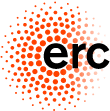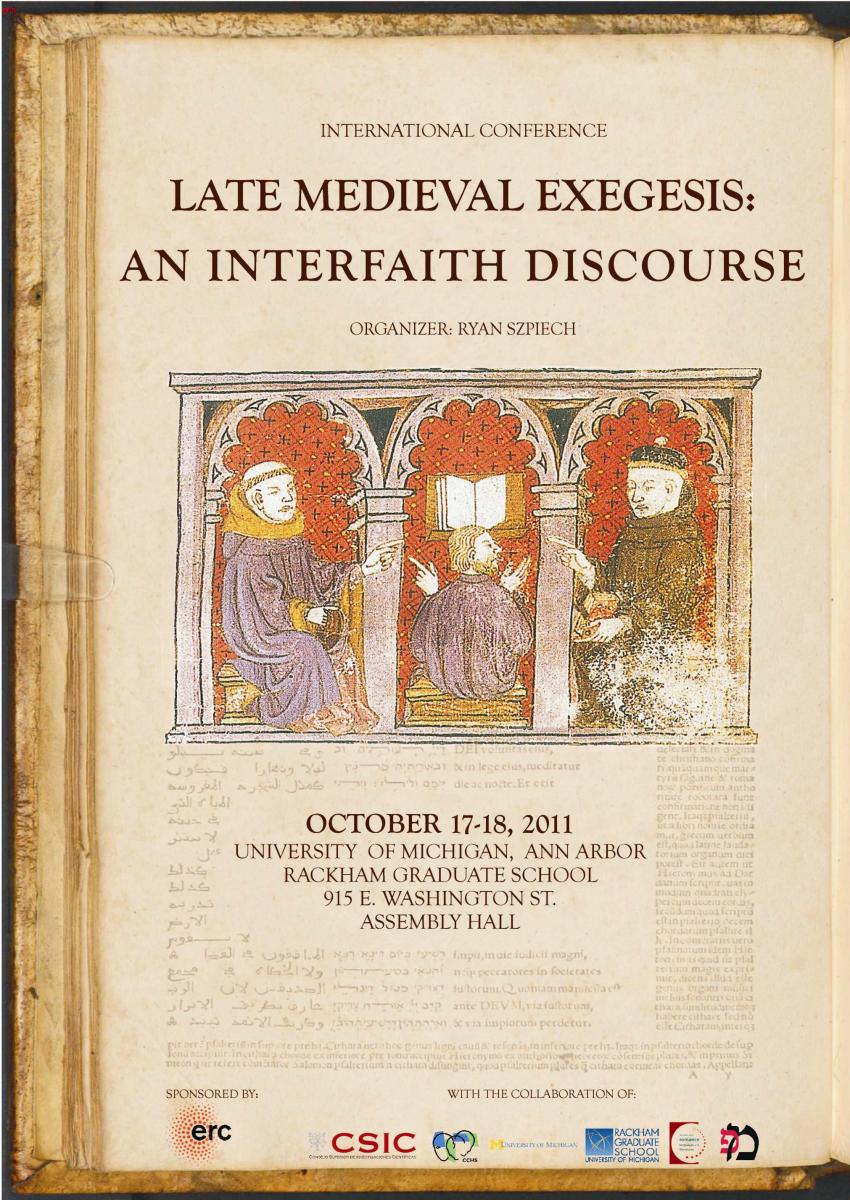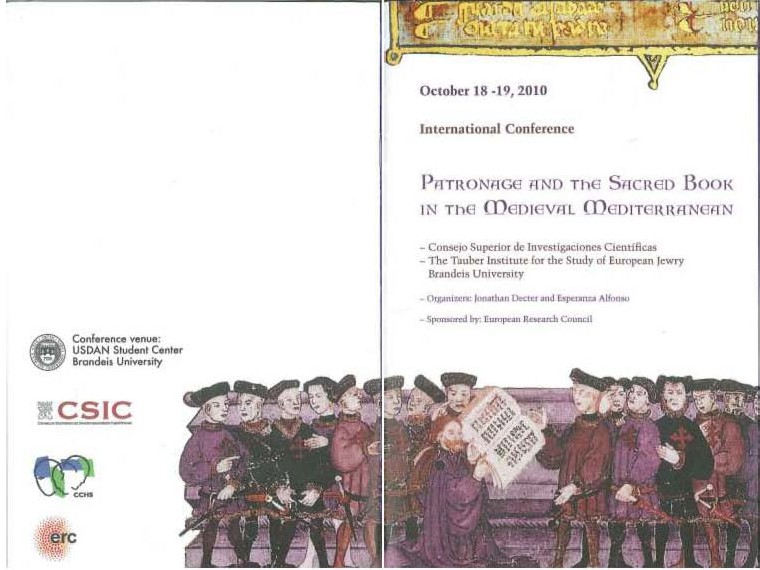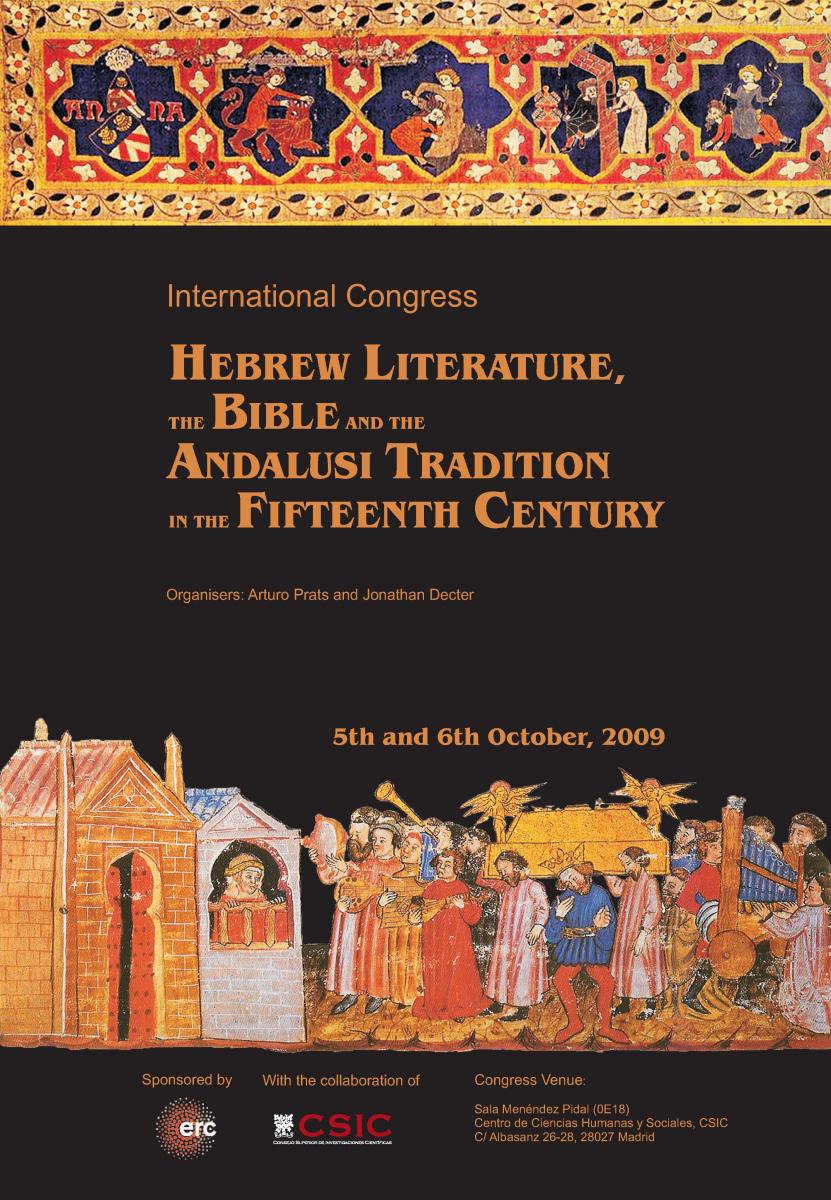Conferencias
|
Congreso internacional The Hebrew Book in the Western Mediterranean: 13th to 16th Centuries
Javier del Barco (ILC, CCHS-CSIC)
CCHS-CSIC y Biblioteca Nacional de España, Madrid
5-6 marzo de 2012
La producción de libros en hebreo (que incluye la fabricación material, la transmisión de textos y la circulación de ejemplares) fue un factor clave en la historia de la cultura judía durante la Edad Media y la temprana Edad Moderna. Este congreso estudiará cuestiones relativas al patronazgo, producción, circulación y consumo de libros en hebreo en el Mediterráneo occidental durante la Baja Edad Media y temprana Edad Moderna (siglos XIII-XVI).
¿Cómo afectaron las prácticas de lectura a la fabricación material de los códices y, posteriormente, de los libros impresos? ¿Hasta qué punto las demandas de patronazgo fomentaron o limitaron el compromiso intelectual y artístico? ¿Qué papel jugó la movilidad voluntaria o forzosa en la circulación de libros y en la creación de bibliotecas? ¿De qué manera el libro impreso afectó a la producción de manuscritos y a la transmisión de textos a finales del siglo XV y principios del siglo XVI?
DESCARGA EL PROGRAMA DEL CONGRESO (PDF)
Más información en: http://www.congresos.cchs.csic.es/hebrewbook/
Financiado por:
 Con la colaboración de:
  
|
|
International Conference The Hebrew Book in the Western Mediterranean: 13th to 16th Centuries
Javier del Barco (ILC, CCHS-CSIC)
CCHS-CSIC and Biblioteca Nacional de España, Madrid
5-6 March 2012
Hebrew book production (including material making, text transmission and book circulation) was at the core of Jewish cultural history during the Middle Ages and Early Modernity. This conference will investigate issues in the patronage, production, circulation and consumption of Hebrew books in the Western Mediterranean during the Late Middle Ages and Early Modern Times (13th to 16th Centuries).
How did reading practices affect on the material making of codices and, later on, of printed books? To what extend did the demands of patronage foster or constrain areas of intellectual and artistic engagement? What role did voluntary or forced mobility play in book circulation and library building? In what ways did the printed book have an effect on manuscript production and text transmission in late 15th and early 16th centuries?
The interest of this conference is twofold: the material production of books in interacting contexts and the role of owners and readers in both book circulation and text transmission. In exploring these questions, the participants will address the adoption of book-making techniques across cultural boundaries, the effect of mobility in book production and work selection in Italy and Northern Africa, the impact of printing in book acquisition, and the interest in buying, reading, or collecting Hebrew books in 15th century Iberia and beyond.
DOWNLOAD THE CONFERENCE PROGRAM (PDF) For more information: http://www.congresos.cchs.csic.es/hebrewbook/ Project INTELEG (ILC):
http://www.lineas.cchs.csic.es/inteleg Sponsored by
 With the collaboration of
 
|
|
Late Medieval Exegesis: An Interfaith Discourse
Ryan Szpiech
University of Michigan- Ann Arbor, Michigan, USA
October 17-18, 2011
Exegesis and scriptural commentary is at the heart of Jewish, Christian, and Muslims traditions. Evolving in all three Abrahamic traditions as a multifaceted practice—at once social, devotional, intellectual, creative, and educational—it constituted an essential aspect of expression and belief. At the same time, because it dealt by nature with issues such as the nature of the canon, the limits of acceptable interpretation, and the meaning of salvation history from the perspective of faith, exegesis was always elaborated on the fault-lines of inter-confessional disputation and polemical conflict. This conference will explore the nature of medieval exegesis during the High and especially the Late Middle Ages (roughly from the 11th to the 15th Centuries) as an interfaith discourse in all three traditions, paying particular attention to the exegetical production of scholars in the Western Mediterranean. Seeking to move beyond the best-known and most obvious examples of interfaith exegesis, this conference seeks to explore the following questions: Who was reading exegesis from other faith traditions and in what contexts? In what contexts did exegetes collaborate across confessional divisions? Was the interfaith discourse of medieval exegetes always a polemical discourse, or was there also a counter-tradition of “irenical” exegesis? How did the practical and technical demands of reading foreign scriptures and commentaries affect exegetes’ views and traditions? In what way did exegetical practice essentialize or de-essentialize their practitioners? How did individual exegetes working with foreign commentaries negotiate their relationship with the larger traditions to which they themselves belonged? How did these issues manifest themselves in the physical practice of manuscript preparation and copying or in the subsequent impact and dissemination of such copies? In exploring these questions, the participants will address the relations between commentary, polemic, dialogue, and scholarship across and within the boundaries of Jewish, Christian, and Muslim scriptural interpretation. In particular, they will look at the nature of exegesis in the late-medieval Western Mediterranean apart from the earlier traditions of exegesis before the 11th century and also apart from the abundant exegetical work that continued to develop further north after the fifteenth century.
See the Conference website here.
|
|
Late Medieval Exegesis: An Interfaith Discourse
Ryan Szpiech
Universidad de Michigan- Ann Arbor, Michigan, USA
Octubre 17-18, 2011
Exegesis and scriptural commentary is at the heart of Jewish, Christian, and Muslims traditions. Evolving in all three Abrahamic traditions as a multifaceted practice—at once social, devotional, intellectual, creative, and educational—it constituted an essential aspect of expression and belief. At the same time, because it dealt by nature with issues such as the nature of the canon, the limits of acceptable interpretation, and the meaning of salvation history from the perspective of faith, exegesis was always elaborated on the fault-lines of inter-confessional disputation and polemical conflict. This conference will explore the nature of medieval exegesis during the High and especially the Late Middle Ages (roughly from the 11th to the 15th Centuries) as an interfaith discourse in all three traditions, paying particular attention to the exegetical production of scholars in the Western Mediterranean. Seeking to move beyond the best-known and most obvious examples of interfaith exegesis, this conference seeks to explore the following questions: Who was reading exegesis from other faith traditions and in what contexts? In what contexts did exegetes collaborate across confessional divisions? Was the interfaith discourse of medieval exegetes always a polemical discourse, or was there also a counter-tradition of “irenical” exegesis? How did the practical and technical demands of reading foreign scriptures and commentaries affect exegetes’ views and traditions? In what way did exegetical practice essentialize or de-essentialize their practitioners? How did individual exegetes working with foreign commentaries negotiate their relationship with the larger traditions to which they themselves belonged? How did these issues manifest themselves in the physical practice of manuscript preparation and copying or in the subsequent impact and dissemination of such copies? In exploring these questions, the participants will address the relations between commentary, polemic, dialogue, and scholarship across and within the boundaries of Jewish, Christian, and Muslim scriptural interpretation. In particular, they will look at the nature of exegesis in the late-medieval Western Mediterranean apart from the earlier traditions of exegesis before the 11th century and also apart from the abundant exegetical work that continued to develop further north after the fifteenth century.
Puede ver la web del Congreso aquí.
|
|
Patronage and the Sacred Book in the Medieval Mediterranean
Organizado por Esperanza Alfonso (CSIC) y Jonathan Decter (Universidad de Brandeis)
Universidad de Brandeis
18 a 19 de Octobre de 2010
Sacred books (including Jewish Bibles, Christian Bibles, Qur´ans, prayer books, psalters, haggadot, translations of and commentaries on Scripture, etc.) were at the center of book production for Jews, Christians and Muslims throughout the Middle Ages. This conference will investigate issues in the patronage, production, circulation and consumption of sacred books in the Western Mediterranean during the High and Late Middle Ages (roughly 10th-15th Century). In what ways did the demands of patronage nurture, determine, or constrain areas of intellectual and artistic engagement? How did patronage in the royal court differ from patronage in other contexts (the Church, religious orders, the madrasa, the university, the circles of learned elites, non-institutional settings)? What role did women play in the patronage, production or circulation of books? The interest of this conference is twofold: the patronage of sacred texts in comparative contexts and the role of inter-religious elements in the production of sacred texts. The participants will address the adoption of book-making techniques across religious boundaries, Jewish/Christian/Muslim collaborative translations of art/text productions, interest in reading, producing, or interpreting the sacred texts of other religious traditions, and other related questions.
Puede ver la web del Congreso aquí.
|
|
Hebrew Literature, the Bible and the Andalusi Tradition in the Fifteenth Century
Organizado por Arturo Prats (UCM) y Jonathan Decter (Universidad de Brandeis)
CCHS-CSIC
5 a 6 de Octobre de 2009
El estudio de los siglos XIV y XV de la península Ibérica proporciona información única sobre los estudios literarios y sociales relacionados con la conversión de masas, con la reformulación de la identidad cultural de aquellos que se convierten. El congreso se dirige a los estudiosos de hebreo, letras latinas y románicas, así como de historia medieval interesados en la poesía y la historiografía. También se tratarán aquellos trabajos relacionados con los textos sagrados y la producción medieval del Mediterráneo.
|
|
Patronage and the Sacred Book in the Medieval Mediterranean
Organized by Esperanza Alfonso (CSIC) and Jonathan Decter (Brandeis University)
Brandeis University
October 18-19, 2010
Sacred books (including Jewish Bibles, Christian Bibles, Qur´ans, prayer books, psalters, haggadot, translations of and commentaries on Scripture, etc.) were at the center of book production for Jews, Christians and Muslims throughout the Middle Ages. This conference will investigate issues in the patronage, production, circulation and consumption of sacred books in the Western Mediterranean during the High and Late Middle Ages (roughly 10th-15th Century). In what ways did the demands of patronage nurture, determine, or constrain areas of intellectual and artistic engagement? How did patronage in the royal court differ from patronage in other contexts (the Church, religious orders, the madrasa, the university, the circles of learned elites, non-institutional settings)? What role did women play in the patronage, production or circulation of books? The interest of this conference is twofold: the patronage of sacred texts in comparative contexts and the role of inter-religious elements in the production of sacred texts. The participants will address the adoption of book-making techniques across religious boundaries, Jewish/Christian/Muslim collaborative translations of art/text productions, interest in reading, producing, or interpreting the sacred texts of other religious traditions, and other related questions.
See the Conference website here.
|
|
Hebrew Literature, the Bible and the Andalusi Tradition in the Fifteenth Century
Organized by Arturo Prats (UCM) and Jonathan Decter (Brandeis University)
CCHS-CSIC
October 5-6, 2009
The fourteenth and fifteenth centuries in Iberia provide a particularly interesting and unique study case for literary and social studies in that mass conversion, among other political and intellectual factors, led Jews, Christians, converts, believers and sceptics to reformulate their cultural past. We would like to open this conference primarily to scholars of Hebrew, Latin and Romance literatures and scholars of late medieval history who study poetry, imaginative fiction and historiography. Scholars whose work deals with the relationship between other sacred texts and late medieval literary production in the broader Mediterranean world (e.g. the relationship between the Qur’an and Arabic literature) and those dealing with the visual arts and material culture are also welcome to participate.
|





